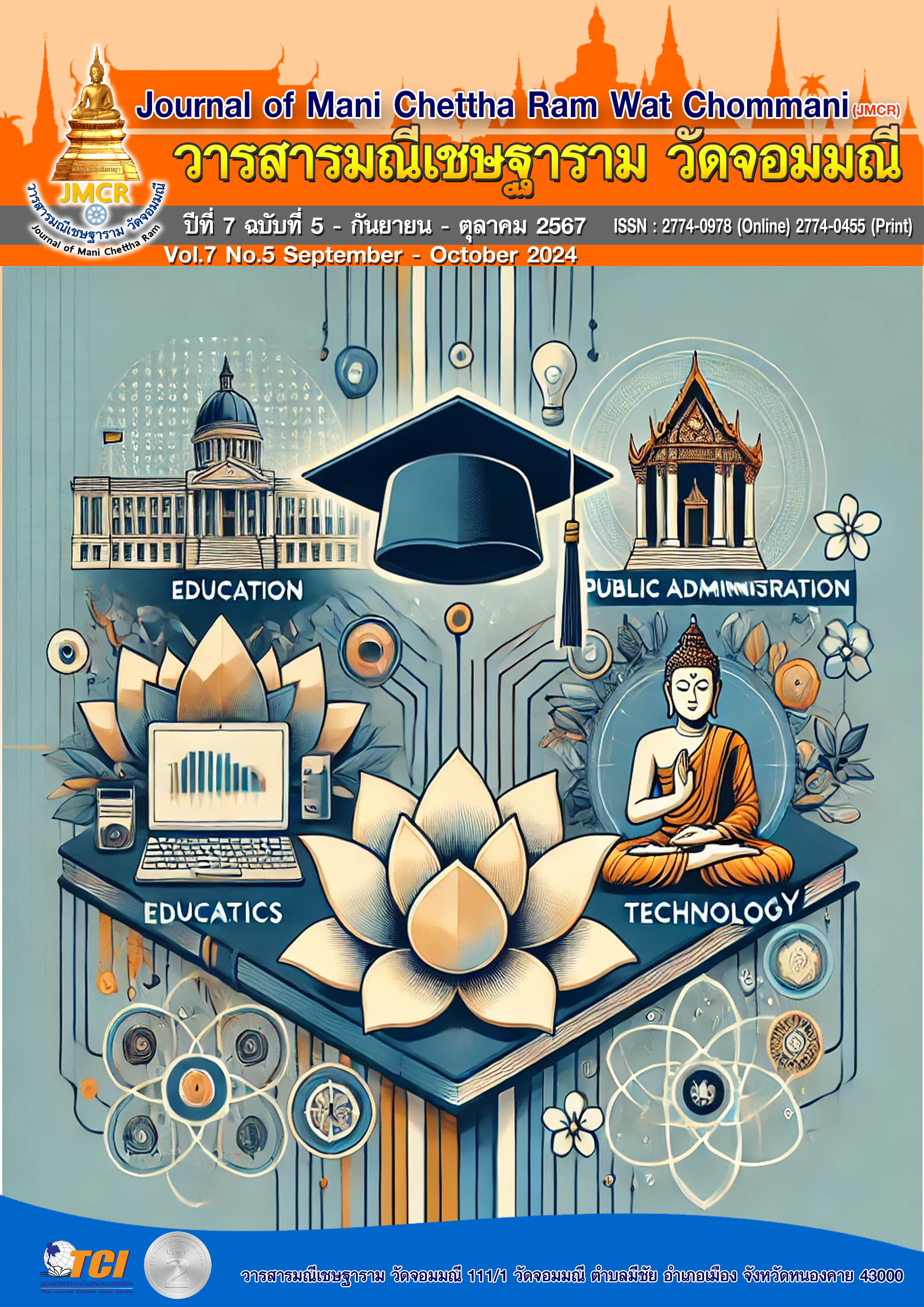การจัดการศึกษาระดับอุดมศึกษาในยุคดิจิทัล
คำสำคัญ:
การศึกษาระดับอุดมศึกษา; ยุคดิจิทัล; เทคโนโลยีการศึกษา; การเรียนรู้แบบผสมผสาน; ทักษะดิจิทัลบทคัดย่อ
ในยุคปัจจุบันมีการเปลี่ยนแปลงทางเทคโนโลยีแบบก้าวกระโดด ส่งผลกระทบให้ทุกหน่วยงานต้องพัฒนาตนเองอย่างต่อเนื่อง เพื่อให้ทันการเปลี่ยนแปลงนี้ทางด้านการศึกษาก็เช่นกันที่ต้องรับมือ และมีการจัดการระบบทางการศึกษาให้ก้าวทันยุคดิจิทัล การจัดการศึกษาระดับอุดมศึกษาในยุคดิจิทัลเป็นประเด็นที่มีความสำคัญและท้าทายอย่างยิ่งในศตวรรษที่ 21 การศึกษาครั้งนี้มุ่งนำเสนอภาพรวมของการเปลี่ยนแปลง ความท้าทาย และแนวทางในการจัดการศึกษาระดับอุดมศึกษาท่ามกลางการเปลี่ยนแปลงทางเทคโนโลยีอย่างรวดเร็ว ผลการศึกษาพบว่า การจัดการศึกษาระดับอุดมศึกษาในยุคดิจิทัลจำเป็นต้องปรับเปลี่ยนในหลายมิติ ได้แก่ (1) การปรับรูปแบบการเรียนการสอนโดยบูรณาการเทคโนโลยีดิจิทัล เช่น การเรียนแบบผสมผสานและหลักสูตรออนไลน์แบบเปิด (2) การพัฒนาทักษะดิจิทัลที่จำเป็นสำหรับผู้เรียนและบุคลากรทางการศึกษา (3) การปรับปรุงหลักสูตรให้สอดคล้องกับความต้องการของตลาดแรงงานในยุคดิจิทัล (4) การลงทุนในโครงสร้างพื้นฐานด้านเทคโนโลยีสารสนเทศ (5) การพัฒนาระบบประกันคุณภาพการศึกษาที่เหมาะสมกับการเรียนการสอนในรูปแบบดิจิทัล และ (6) การส่งเสริมการวิจัยและนวัตกรรมทางการศึกษา และพบความท้าทายสำคัญของการศึกษาในยุคดิจิทัล ได้แก่ การรับมือกับความเหลื่อมล้ำทางดิจิทัล การรักษาสมดุลระหว่างการใช้เทคโนโลยีและการปฏิสัมพันธ์ระหว่างมนุษย์ และการพัฒนาทักษะการคิดวิเคราะห์และความคิดสร้างสรรค์ท่ามกลางข้อมูลที่ท่วมท้น สรุปผลการศึกษาได้ว่า การจัดการศึกษาระดับอุดมศึกษาในยุคดิจิทัลต้องอาศัยการบูรณาการเทคโนโลยีอย่างชาญฉลาด การพัฒนาทักษะที่จำเป็น และการสร้างความร่วมมือระหว่างภาคส่วนต่าง ๆ เพื่อเตรียมความพร้อมให้ผู้เรียนสามารถรับมือกับการเปลี่ยนแปลงในอนาคตและตอบสนองความต้องการของสังคมในยุคดิจิทัลได้อย่างมีประสิทธิภาพ
เอกสารอ้างอิง
Ally, M., & Prieto-Blzquez, J. (2014). What is the future of mobile learning in education?. RUSC. Universities and Knowledge Society Journal, 11(1), 142-151.
Becker, S. A., Brown, M., Dahlstrom, E., Davis, A., DePaul, K., Diaz, V., & Pomerantz, J. (2018). NMC horizon report: 2018 higher education edition. Louisville, CO: Educause.
Dahlstrom, E., Brooks, D. C., & Bichsel, J. (2014). The current ecosystem of learning management systems in higher education: Student, faculty, and IT perspectives
Garrison, D. R., & Kanuka, H. (2004). Blended learning: Uncovering its transformative potential in higher education. The internet and higher education, 7(2), 95-105.
Garrison, D. R., & Cleveland-Innes, M. (2005). Facilitating cognitive presence in online learning: Interaction is not enough. The American journal of distance education, 19(3), 133-148.
Gašević, D., Dawson, S., & Siemens, G. (2015). Let’s not forget: Learning analytics are about learning. TechTrends, 59, 64-71.
Kato, S., Galán-Muros, V., & Weko, T. (2020). The emergence of alternative credentials.
Keengwe, J., & Kidd, T. T. (2010). Towards best practices in online learning and teaching in higher education. MERLOT Journal of Online Learning and Teaching, 6(2), 533-541.
Liyanagunawardena, T. R., Adams, A. A., & Williams, S. A. (2013). MOOCs: A systematic study of the published literature 2008-2012. International review of research in open and distributed learning, 14(3), 202-227.
Means, B., Toyama, Y., Murphy, R., Bakia, M., & Jones, K. (2009). Evaluation of evidence-based practices in online learning: A meta-analysis and review of online learning studies.
Ossiannilsson, E., Williams, K., Camilleri, A. F., & Brown, M. (2015). Quality models in online and open education around the globe. State of the art and recommendations. Oslo: International Council for Open and Distance Education.
Pardo, A., & Siemens, G. (2014). Ethical and privacy principles for learning analytics. British journal of educational technology, 45(3), 438-450.
Siemens, G., & Long, P. (2011). Penetrating the fog: Analytics in learning and education. EDUCAUSE review, 46(5), 30.
Selwyn, N. (2007). The use of computer technology in university teaching and learning: a critical perspective. Journal of computer assisted learning, 23(2), 83-94.
Tondeur, J., Van Braak, J., Ertmer, P. A., & Ottenbreit-Leftwich, A. (2017). Understanding the relationship between teachers’ pedagogical beliefs and technology use in education: A systematic review of qualitative evidence. Educational technology research and development, 65, 555-575.
Trilling, B., & Fadel, C. (2009). 21st century skills: Learning for life in our times. John Wiley & Sons.
Van Laar, E., Van Deursen, A. J., Van Dijk, J. A., & De Haan, J. (2017). The relation between 21st-century skills and digital skills: A systematic literature review. Computers in human behavior, 72, 577-588.
Warschauer, M., & Matuchniak, T. (2010). New technology and digital worlds: Analyzing evidence of equity in access, use, and outcomes. Review of research in education, 34(1), 179-225.
Waycott, J., Bennett, S., Kennedy, G., Dalgarno, B., & Gray, K. (2010). Digital divides? Student and staff perceptions of information and communication technologies. Computers & education, 54(4), 1202-1211.




